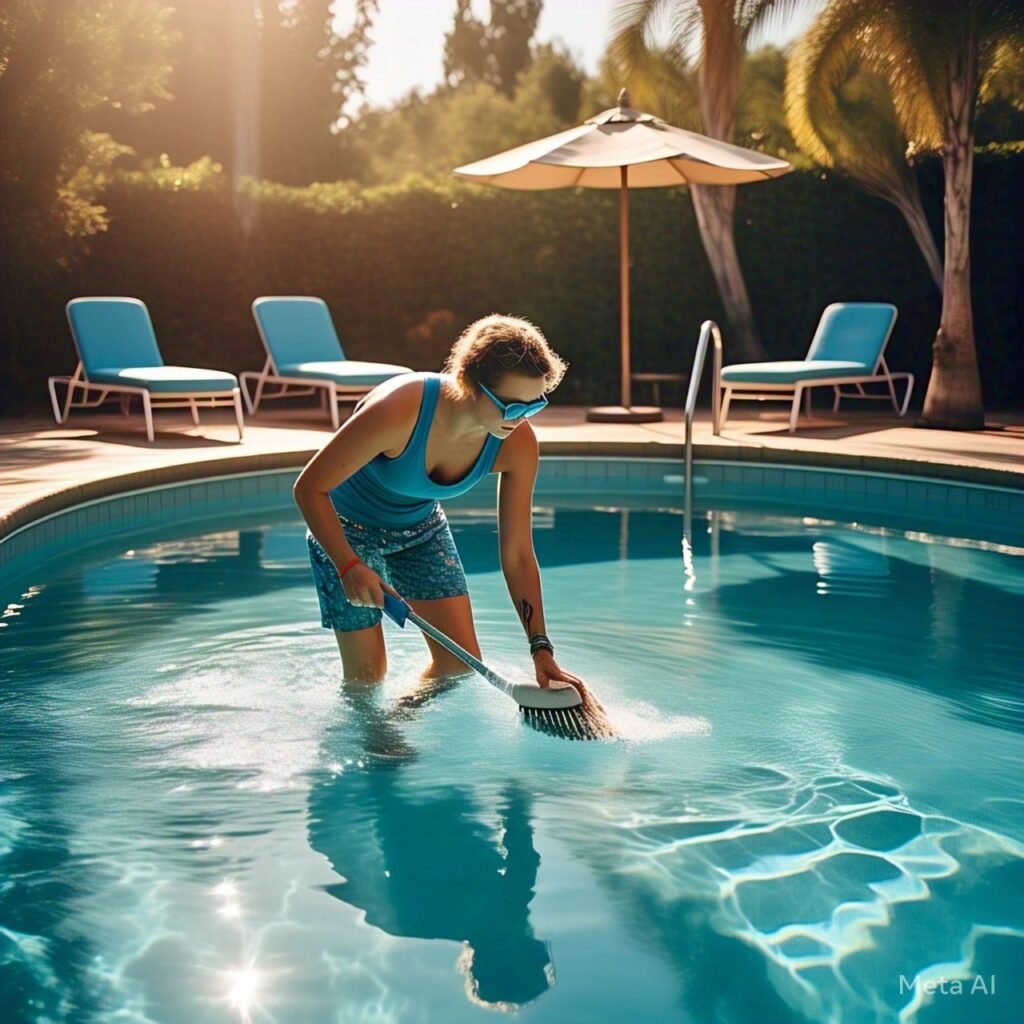Cleaning pool tiles is an essential part of maintaining a beautiful and functional swimming pool. Over time, pool tiles can accumulate dirt, grime, calcium deposits, and algae, which not only detract from the pool’s appearance but can also lead to damage if left untreated. In this comprehensive guide, we’ll explore expert tips for cleaning pool tiles effectively, covering the best tools, products, and techniques to keep your pool looking its best.
Why Cleaning Pool Tiles is Important
Cleaning pool tiles is more than just a cosmetic task. Dirty or stained tiles can harbor bacteria, algae, and other contaminants that affect water quality. Additionally, calcium buildup and grime can weaken the tiles over time, leading to costly repairs. Regular cleaning not only enhances the beauty of your pool but also extends the lifespan of your tiles and ensures a healthier swimming environment.
Start with a Routine Inspection
Before diving into cleaning pool tiles, it’s important to inspect them thoroughly. Look for signs of calcium deposits, algae growth, or discoloration. Identifying the type of buildup will help you choose the right cleaning method. For example, white, chalky stains are often calcium deposits, while green or black spots indicate algae. A thorough inspection ensures you address the specific issues affecting your pool tiles.
Use the Right Tools for Cleaning Pool Tiles
Having the right tools makes cleaning pool tiles much easier and more effective. Some essential tools include:
- Pool tile brush: A soft-bristled brush designed specifically for tiles to avoid scratching.
- Pumice stone: Effective for removing tough calcium deposits on hard tiles like porcelain or ceramic.
- Sponge or scrub pad: Ideal for gentle cleaning of delicate tiles.
- Tile cleaner: Choose a cleaner specifically designed for pool tiles to ensure safety and effectiveness.
Using the right tools not only makes the job easier but also helps prevent damage to your tiles.
Choose the Best Cleaning Products
Not all cleaning products are safe for pool tiles. Harsh chemicals can damage the tiles or affect the pool’s water chemistry. Opt for pH-neutral cleaners or natural solutions like vinegar and baking soda. For stubborn stains, consider using a commercial pool tile cleaner that’s safe for your tile material. Always read the product labels and follow the manufacturer’s instructions to avoid damaging your tiles.
Remove Debris Before Cleaning Pool Tiles
Before you start cleaning pool tiles, remove any debris from the pool surface. Use a skimmer net to clear leaves, dirt, and other floating debris. This step ensures that the cleaning process is more effective and prevents debris from sticking to the tiles during cleaning. A clean pool surface also makes it easier to focus on the tiles without distractions.
Tackle Calcium Deposits Effectively
Calcium deposits are a common issue in pools with hard water. These deposits can make your pool tiles look dull and feel rough. To remove them:
- Use a pumice stone for scrubbing (only on hard tiles like porcelain or ceramic).
- Apply a calcium remover product and let it sit for a few minutes before scrubbing.
- For mild deposits, a mixture of vinegar and water can work wonders.
Regularly addressing calcium deposits will keep your tiles looking clean and smooth.
Prevent Algae Growth on Pool Tiles
Algae can make pool tiles slippery and unsightly. To prevent and remove algae:
- Brush the tiles regularly to disrupt algae growth.
- Use an algaecide product to treat the water and prevent algae from forming.
- For existing algae, scrub the tiles with a mixture of water and chlorine.
Preventing algae growth not only keeps your tiles clean but also ensures a safer swimming environment.
Clean Grout Lines Between Tiles
Grout lines between pool tiles can trap dirt and algae, making them a common problem area. Use a small brush or an old toothbrush to clean these areas. For stubborn grime, apply a grout cleaner and let it sit before scrubbing. Sealing the grout after cleaning can help prevent future buildup and make maintenance easier.

Use a Pool Tile Cleaning Machine
For large pools or heavily stained tiles, consider using a pool tile cleaning machine. These devices use high-pressure water jets to remove dirt and deposits without damaging the tiles. They are especially useful for cleaning hard-to-reach areas and can save you time and effort.
Maintain Proper Water Chemistry
Balanced water chemistry is key to preventing tile stains and buildup. Regularly test and adjust the pH, alkalinity, and calcium hardness levels in your pool. High pH levels can lead to calcium deposits, while low levels can cause corrosion. Maintaining proper water chemistry not only keeps your tiles clean but also protects your pool equipment and ensures a safe swimming environment.
Schedule Regular Cleaning Sessions
Cleaning pool tiles should be part of your regular pool maintenance routine. Aim to clean the tiles at least once a month to prevent buildup and keep your pool looking pristine. Regular cleaning also reduces the need for intensive scrubbing or expensive repairs. By staying consistent with your cleaning schedule, you can enjoy a sparkling pool year-round.
DIY Solutions for Cleaning Pool Tiles
If you prefer natural cleaning methods, try these DIY solutions:
- Vinegar and baking soda: Mix equal parts vinegar and baking soda to create a paste. Apply it to the tiles, let it sit for 15 minutes, and scrub gently.
- Lemon juice: The acidity of lemon juice helps break down calcium deposits. Apply it directly to the stains and scrub with a brush.
- Hydrogen peroxide: A mild bleach alternative that’s effective for removing algae and stains.
These natural solutions are not only effective but also environmentally friendly.
When to Call a Professional for Cleaning Pool Tiles
While DIY methods work for most tile cleaning tasks, some situations require professional help. If you notice extensive damage, persistent stains, or if you’re unsure about the right cleaning method, consult a pool maintenance expert. They have the tools and expertise to restore your tiles safely and effectively. Professional cleaning can also save you time and ensure long-lasting results.
Preventive Tips for Keeping Pool Tiles Clean
Prevention is always better than cure. Here are some tips to keep your pool tiles clean for longer:
- Brush the tiles weekly to prevent buildup.
- Maintain proper water chemistry to avoid stains.
- Use a pool cover to keep debris out of the water.
- Address spills or stains immediately to prevent them from setting.
By following these preventive measures, you can minimize the need for frequent cleaning and keep your pool tiles in excellent condition.
Conclusion
Cleaning pool tiles is a vital part of pool maintenance that ensures your pool remains beautiful, safe, and functional. By following these expert tips, you can tackle dirt, calcium deposits, and algae effectively. Whether you choose DIY solutions or professional services, regular cleaning will keep your pool tiles sparkling and extend their lifespan. Remember, a clean pool is a happy pool!
